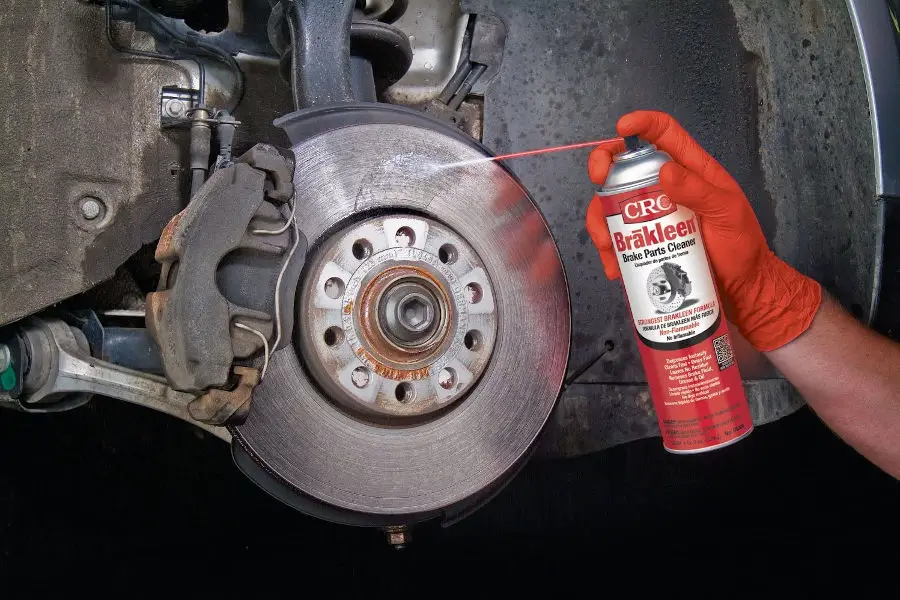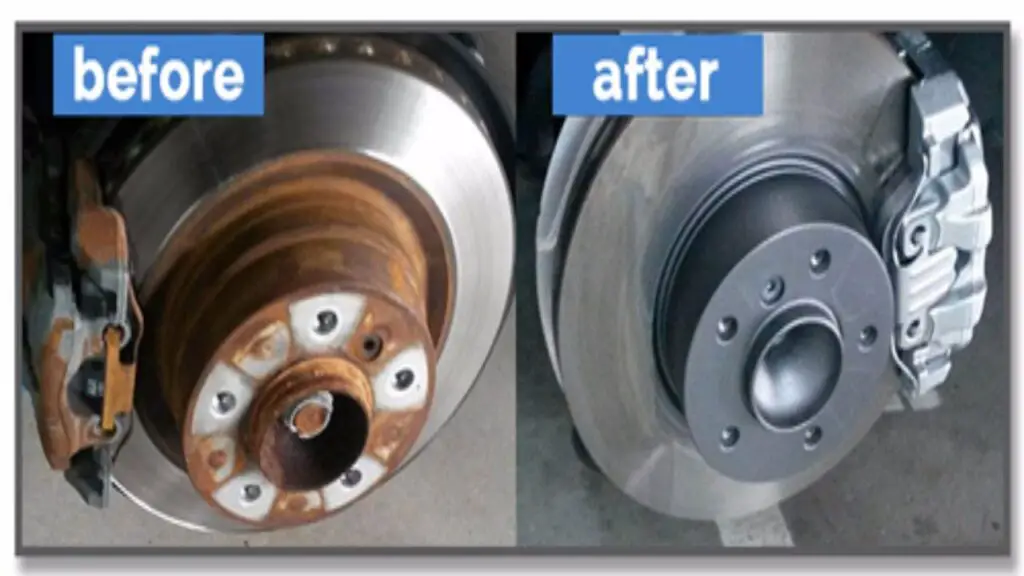Does brake cleaner remove rust? Only light surface rust. It’s not made for deep or heavy rust removal. Use rust removers or tools for better results.
Rust is a common issue that affects various metal components in vehicles, especially in areas exposed to moisture and road salts. One frequently asked question among car enthusiasts and DIY mechanics is whether brake cleaner can effectively remove rust.
This guide delves into the capabilities of brake cleaner in rust removal, its limitations, and best practices for maintaining rust-free vehicle components.

Contents
Brake Cleaner
Brake cleaner is a solvent-based product designed primarily to clean brake components by removing grease, oil, brake dust, and other contaminants. It comes in two main types: chlorinated and non-chlorinated.
Both types are effective at cleaning brake components but differ in their chemical compositions and safety profiles.
Can Brake Cleaner Remove Rust?
Brake cleaner can remove light surface rust to some extent. Its solvent properties allow it to break down and wash away contaminants, including some rust particles. However, it’s essential to understand its limitations:
- Surface Rust: Brake cleaner can help in loosening and removing superficial rust when used with mechanical action like scrubbing with a wire brush or steel wool.
- Deep or Pitted Rust: For more severe rust, especially where the metal has pitted or corroded deeply, brake cleaner is ineffective. In such cases, dedicated rust removers or mechanical methods like sanding or grinding are necessary.
Therefore, while brake cleaner can assist in rust removal, it’s not a comprehensive solution for all rust-related issues.

Best Practices for Using Brake Cleaner on Rust
Brake cleaner is not a rust remover. It’s mainly designed to remove grease, oil, and brake dust. That said, here are best practices for using brake cleaner on rust:
- Safety First: Always use brake cleaner in a well-ventilated area. Wear gloves and eye protection to prevent skin and eye irritation.
- Preparation: Before applying brake cleaner, remove loose rust with a wire brush. This step enhances the effectiveness of the cleaner.
- Application: Spray the brake cleaner directly onto the rusted area. Allow it to sit for a few minutes to penetrate the rust.
- Scrubbing: Use a wire brush or steel wool to scrub the area, removing loosened rust particles.
- Repeat if Necessary: For stubborn rust, multiple applications may be required.
- Post-Cleaning: After rust removal, consider applying a rust inhibitor or primer to prevent future rust formation.
Alternatives to Brake Cleaner for Rust Removal
While brake cleaner can aid in rust removal, other methods may be more effective for severe rust:
- Dedicated Rust Removers: Products containing phosphoric or oxalic acid can chemically convert rust into a stable compound, making it easier to remove.
- Mechanical Methods: Sanding, grinding, or using abrasive pads can physically remove rust layers.
- Electrolysis: An electrochemical process that uses electrical current to remove rust from metal objects.
- Homemade Solutions: Soaking rusted parts in vinegar or lemon juice can help dissolve rust over time.
Preventing Rust Formation
Prevention is always better than cure. To minimize rust formation:
- Regular Cleaning: Keep vehicle components clean and dry.
- Protective Coatings: Apply paint, powder coating, or rust inhibitors to exposed metal surfaces.
- Storage: Store vehicles or parts in dry environments to reduce moisture exposure.
- Routine Inspections: Regularly inspect for early signs of rust and address them promptly.
Frequently Asked Questions
Here are some FAQs about use of brake cleaner in rust –
Can brake cleaner prevent rust?
No, brake cleaner does not prevent rust. It cleans surfaces but does not provide any protective coating against moisture or oxidation.
Is it safe to use brake cleaner on all metal parts?
While generally safe for metals, brake cleaner can damage certain plastics, rubber components, and painted surfaces. Always test on a small area first.
Does brake cleaner leave a residue?
Most brake cleaners evaporate quickly and leave no residue, making them ideal for cleaning brake components.
Can I use brake cleaner on painted surfaces?
It’s not recommended, as brake cleaner can strip paint and damage finishes.
How often should I use brake cleaner for maintenance?
Use brake cleaner as needed, especially when servicing brake components or when you notice buildup of grease and grime.
Conclusion
Brake cleaner is a valuable tool for maintaining clean brake components and can assist in removing light surface rust. However, for more severe rust issues, alternative methods and products are more effective. Regular maintenance and preventive measures are key to ensuring the longevity and safety of your vehicle’s components.